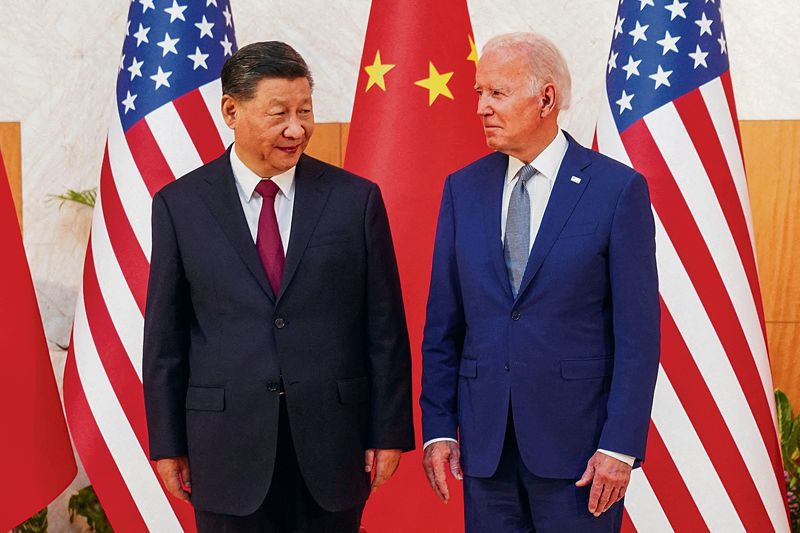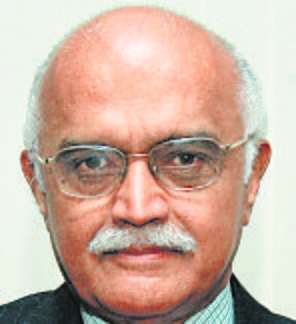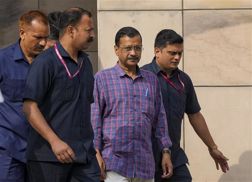
HARD TALK: US President Joe Biden has told his Chinese counterpart, Xi Jinping, that restrictions on high-technology exports to China are necessary to protect American security interests. Reuters
Vappala Balachandran
Former Special Secretary, Cabinet Secretariat
LAST week, US President Joe Biden told his Chinese counterpart, Xi Jinping, that US restrictions on high-technology exports to China were necessary to prevent advanced US technologies from being used by Beijing to undermine American security. He also said that these steps were taken without unduly limiting trade and investment.
Xi responded by stating that such curbs would create ‘risks for bilateral ties’ by suppressing China’s trade and technology development. According to the Chinese readout, Xi also told Biden that Beijing would not ‘sit back and watch’ if the US continued to impose such restrictions.
China had already moved the World Trade Organisation (WTO) in December 2022 against US restrictions on advanced computing semiconductor chips, supercomputer items, semiconductor manufacturing items, related services and technologies for China, which it said had violated the relevant articles of the General Agreement on Tariffs and Trade, the Agreement on Trade-Related Measures and the Trade-Related Aspects of Intellectual Property Rights. What other steps would the Dragon take now?
In the pre-2024 election mood, some sections of America are treating Xi’s warning as a result of ‘Biden’s weakness’ in dealing with a more assertive China. The Rupert Murdoch-owned New York Post recently went to the extent of alleging that Xi might be having ‘damning dirt on the Biden family’s multimillion-dollar business dealings in China’ or that Biden might be too reticent to escalate ‘overseas tension’.
Also, this has reignited an old controversy that the Bill Clinton administration was hasty in helping China enter the WTO in 2000. In 2017, Robert Lighthizer, then President Donald Trump’s US Trade Representative (USTR), reported to the US Congress that ‘the United States erred in supporting China’s entry into the WTO on terms that have proven to be ineffective in securing China’s embrace of an open, market-oriented trade regime’.
Tesla’s recent slump in China is being cited as an example of how American interests are hit. Just recently, the New York Times said Chinese EV makers are taking market share and becoming a security concern for the US and Europe: “Chinese leaders wanted a Tesla plant to jump-start China’s EV sector… Its Chinese rival BYD overtook it in worldwide sales late last year.” Further, Bloomberg reported a $350-billion ‘slump’ in Tesla’s investor expectations.
There is no evidence that America was remiss in considering its security and commercial interests while allowing China into the WTO. On September 12, 1999, then US President Bill Clinton met his Chinese counterpart Jiang Zemin in New Zealand. Washington’s objectives then were to expect Beijing to respect ‘political pluralism’ and ‘free markets’ through Chinese ‘reformers’. Sandy Berger, Clinton’s National Security Adviser, had then said that the US-China relations were back on track. During that era, Clinton’s trade and security leaders, like Michael Kantor (USTR) and William Perry (Defence Secretary), had said that China was helpful in managing the 1995 Taiwan Strait crisis and North Korea’s nuclear ambitions.
In pursuit of this policy, an all-day discussion was held on September 24, 1999, by the US National Intelligence Council and the Federal Research Division of the Library of Congress to discuss the five-year outlook for China’s domestic development, its international security behaviour and its implications for the US. Its transcripts, running into 104 pages, covered every facet of the US-China relations.
Among those who attended were nine China specialists from the US intelligence community and the directors of the China departments in state and defence. Most of them felt that China’s new features in governance were an increasing institutionalisation, less arbitrary decision-making, civilian-based leadership in its Politburo, the growth of civil society amid increasing wealth and the influence of businessmen and academics.
They also assessed that the Chinese Ministry of Foreign Affairs and the Ministry of Foreign Trade and Economic Cooperation (MOFTEC) would deal with the WTO on its joining, replacing its old-style communist bureaucracies associated with the planning system.
Hence, they concluded that Chinese membership in the WTO would be strongly in the interests of the US, as it would provide ‘American businesses and farmers with direct access to a significant and growing market’.
Following this, the US-China Relations Act of 2000 was signed into law on October 10, 2000, following substantial support in both Houses of the Congress, after which China became a WTO member on December 11, 2001. Joe Biden, then a Senator, stated on record that this would help promote stability across the Taiwan Strait, encourage China to reform its economic system and enhance its respect for the rule of law.
However, as a measure of abundant caution, the Congress also set up a US-China economic and security review commission and the requirement of a statutory USTR report to the Congress to monitor China’s compliance with its WTO obligations. This proved premonitory as signs began to emerge in the 2000s that China had reneged on its promise of market reforms and political pluralism. A hearing by the security review panel on December 13, 2011, gave instances of US technology being used by China to spy on liberals.
Did China deceive America to get into the WTO? This theory emerged with French investigative journalist Roger Faligot’s book, Les Services Secret Chinois (1987). Its updated English translation, Chinese Spies, was reviewed by me for Indian readers.
Chinese leader Deng Xiaoping, during his 1979 charm-offensive visit to the US, took Ling Yun — his new spy chief — to start a liaison with the CIA through the Guoanbu’s (spy agency) second bureau. Guoanbu’s 10th bureau was charged with economic and technical espionage in the US through newly created front organisations like MOFTEC.
As a result, Western countries gathered the impression that Deng was moving away from the earlier ideology-oriented secretive communist model into a more open, institution-driven decision-making system. Faligot connects China’s efforts to enter the WTO with the 1996 ‘Chinagate’ controversy on alleged election funding and a Chinese attempt to influence US domestic politics; it was subjected to a Department of Justice investigation.
Views are personal
Join Whatsapp Channel of The Tribune for latest updates.



























